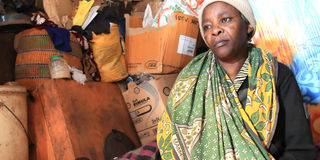Premium
Without an alternative, patients want UHC back

Elizabeth Nyawira during an interview at her home at Majengo in Nyeri on August 26.
In a dimly lit, single room in Majengo, a few kilometres from Nyeri Town, Elizabeth Nyawira lives isolated from the outside world, having been immobile for years. Nyawira suffered a stroke that left her paralysed.
The 63-year-old has HIV/Aids, a factor that contributed to her hypertensive condition that consequently caused the stroke.
For the past two years, she has benefited from free medical services offered in public hospitals in Nyeri County under the Universal Health Coverage (UHC) programme.
Managing her condition requires close monitoring and frequent hospital visits, which would be difficult to keep up with given her condition and financial constraints. However, with the help of community health volunteers she has never been late for a doctor’s appointment or lacked medication.
Update payments
But, her hopes for continued affordable healthcare have been dashed after the county announced an end to the government-funded health insurance cover that saw tens of residents adhere to their clinics. Those who look after Nyawira do odd jobs to put food on the table and they cannot cater for her health demands. “I do not know what to do now that UHC is over. I do not have any other cover and I cannot afford medical care from now onwards,” she told HealthyNation.
Over 800,000 residents enrolled in the UHC project received text messages through M-Tiba — a mobile wallet service dedicated to healthcare payments — advising them to start updating payments to the National Hospital Insurance Fund (NHIF) membership in order to access health services.
The county says it has been forced to cut the programme short as it does not receive funds from the government for the project. Nyeri was among four counties piloting UHC due to its prevalence in non-communicable diseases. The others were Kisumu, Isiolo and Machakos counties.
No communication
The pilot project was supposed to end on December 13 last year, but the four counties were given three more months running until March 13.
Sources at the health department in Nyeri said the extension was done without extra resources.
Since March, Nyeri had committed part of its budgetary allocation to the programme as it awaited direction from the national government.
To date, the source said, there has been no communication to the counties piloting the project. “We are now reverting to the old way, where patients will be charged for every service they receive in the facilities,” said the source.
Nyawira and tens of other residents wish the county government would rescind its decision and continue offering free medical care especially to those chronically ill.
Over 2, 500 people in the four slums within Nyeri Town live below the poverty line making it hard to raise the Sh500 required for the NHIF cover.
Mary Wanja is both diabetic and hypertensive. She is on the verge of losing her eyesight as her condition deteriorates. She relies on well-wishers to read written materials for her.
She has never subscribed to NHIF and as her clinic day draws nearer, she is uncertain whether she will see a doctor or not. “I was never on NHIF because I could not afford it and with UHC over, I cannot afford treatment and medicine. I wish they can continue paying for our healthcare,” said Wanja.
Nyeri was allocated Sh359 million to facilitate the UHC programme, but it had only received Sh159 million by the end of the pilot phase on December 13, last year. The money was meant to cover expenses at the hospitals and carry out community health based activities.
The oncology department that sees more than 100 people will be the most affected as cancer cases go up. Treating cancer uses up to 50 per cent of the drugs budget at the Nyeri referral hospital and the withdrawal of UHC patients is set to deal a blow to this.
NHIF premiums
Nyeri Director of Medical Services Nelson Muriu said since the roll out of UHC, the number of patients seeking treatment at the referral hospital increased by 50 per cent. “There was a registered increased number of visits per person per year. It rose from 2.4 in 2018 to 2.7 in 2019 which is below the World Health Organization recommended visits,” said Dr Muriu, adding that WHO recommends five visits in low and middle income countries.
He further stated that failure to renew NHIF premiums after the roll out of UHC had seen patients pay out of pocket when seeking treatment in private facilities and outside the county.
Since the introduction of UHC in February 2018, a majority of Nyeri residents stopped paying their NHIF premiums, which saw a fall in subscription by 47 per cent, according to NHIF Nyeri branch manager Daniel Chege.
He said the numbers started shooting up again in August and September after it became clear UHC would only be used in public health facilities. “People realised it was beneficial to have both covers in order to access health services even in private hospitals,” he said.
Since the announcement that UHC will no longer be used, the office has activated over 200 accounts everyday as people plan to shift from the free medical cover to NHIF. “We are partnering with the county government and M-Tiba to help residents without the medical cover,” he said.





